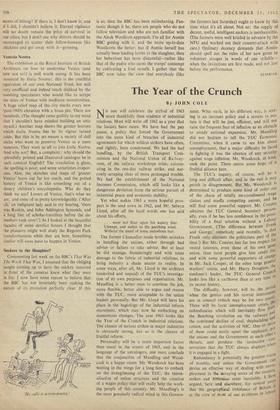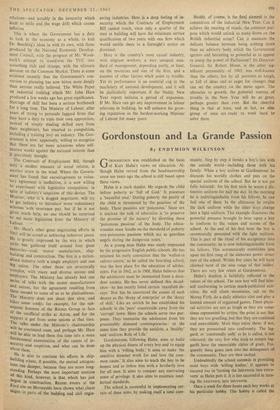The Year of the Crunch
By JOHN COLE No one will celebrate the arrival of 1963 more thankfully than students of industrial relations. Most will write off 1962 as a year that the locusts have eaten. We have had the pay pause, a policy that forced the Government into the same kind of breaches of industrial agreements for which wildcat strikers have often, and rightly, been condemned. We had the bad handling, by the British Transport Com- mission and the National. Union of Railway- men, of the railway workshops crisis, culmin- ating in the one-day railway strike, and nar- rowly scraping clear of more prolonged trouble. We had the establishment of the National Incomes Commission, which still looks like a dangerous deviation from the serious pursuit of industrial peace and economic stability.
Yet what makes 1963 a more hopeful pros- pect is the seed sown in 1962, and Mr. Selwyn Lloyd, after all the hard words one has said about his efforts, . . . must not float upon his watery bier Unwept, and welter to the parching wind, Without the meed of some melodious tear.
The former Chancellor made terrible mistakes in handling the unions, either through bad advice or failure to take advice. But at least he did manage, blunderingly and with some damage to the fabric of industrial relations, to bring industry a shade nearer to reality. In some ways, after all, Mr. Lloyd is the architect (uninvited and unpaid) of the TUC's investiga- tion of its own purposes and organisation. Mr. Maudling is a better man to continue the job, more flexible, better able to argue and reason with the TUC, more acceptable to the union leaders personally. But Mr. Lloyd will have his place in the hagiology of the industrial reform movement, which may now be embarking on momentous changes. The year 1963 looks like the Year of the Crunch in industrial relations. The chance of serious strikes in major industries is obviously strong, but so is the chance of fruitful reform.
Personality will be a more important factor than usual in the events of 1963, and in the language of the astrologers, one must conclude that the conjunction of Maudling and Wood- cock is a happy omen. Mr. Woodcock has been waiting in the wings for a long time to embark on the Strengthening of the TUC, the ration- alisation of union structure and the creation of a wages policy that will really help the work- ing people of this country. Mr. Maudling's is the most genuinely radical mind in this Govern- ment. What each, in his different way, is seek- ing is an incomes policy and a system to sus- tain it that will be just, efficient, and will not raise the frequent fear of inflation as an obstacle to steady national expansion. Mr. Maudling did not hesitate to tell the TUC Economic Committee, when it came to see him about unemployment, that a major difficulty he faced in fighting it was the absence of any security against wage inflation. Mr. Woodcock, at least, took the point. There seems some hope of a fruitful alliance here.
The TUC's inquiry, of course, will be a long and difficult affair, and in the end it may perish in disagreement. But Mr. Woodcock is determined to produce some kind of order out of the chaos of totally uncoordinated wage claims and madly competing unions, and be will find some powerful support. Mr. Cousins admires the TUC General Secretary person- ally, even if he has less confidence in the Possi- bility of a final solution without a Labour Government. (`The difference between Frank and George,' somebody said recently, 'is that Frank only distrusts the politicians part of the time.') But Mr. Cousins has far Less respect for vested interests, even those of his own giant union, than most people give him credit for, and with some powerful supporters of change in Mr. Jack Cooper, of the other large genera, workers' union, and Mr. Harry Douglass, steelmen's leader, the TUC General CoUnell looks less like a carthorse than at any tine id its recent history. The difficulty, however, will be the Peri°ri when the genius and his mortal instruments are in council (which may be for two 3/earl); There will be local unemployment crises, ti; redundancies which will inevitably flow ft° d the Beeching revolution on the railwaYs °)ci the continued decline of coal, shipbuilding 3° cotton, and the activities of NIC. One or more „t of these could easily upset the applecart, the unions and the Government at each other throats, and produce the instinctive con- servatism that the TUC always displaYs when it is engaged in a fight. Redundancy is potentially the greatest cause of trouble, and unless the Government e3-11 devise an effective way of dealing with unerri. ployment in the decaying areas of the countrY; strikes and bitterness seem inevitable. 1 ears argued, here' and elsewhere, for several y, that the geographical imbalance of Britain at the core of most of our problems in labour
leads to strife and the wage drift which causes inflation.
This is where the Government has a duty to look at the economy as a whole, to knit Dr. Beeching's ideas in with its own, with those produced by the National Economic Develop- ment Council, with the progress of Mr. Wood- cock's attempt to transform the TUC into something rich and strange, with the ultimate decision on the Common Market. There is some evidence recently that the Government's con- version to planning has now bitten more deeply than anyone really believed. The White Paper on industrial training which Mr. John Hare produced a few weeks ago has great significance. Shortage of skill has been a serious bottleneck for a long time. The Ministry of Labour, after years of trying to persuade laggard firms that they have a duty to train their own apprentices, instead of simply stealing skilled men from their neighbours, has resorted to compulsion, including a training levy on industry. The Gov- ernment is now, apparently, willing to recognise that there are far more occasions when self- interest works against the national interest than it previously thought.
The COntracts of Employment Bill, though only a modest measure of social reform, is another straw in the wind. Where the Govern- ment has found that encouragement to volun- tary agreement is ineffective, it is now willing to experiment with legislative compulsion, in spite of industry's suspicion of this device. The Minister, who is a dogged negotiator, will try to get industry to introduce more redundancy schemes with severance pay, but if he is not given much help, no one should be surprised to see more legislation from the Ministry of Labour.
Mr. Hare's other great negotiating efforts in 1963 will be aimed at achieving industrial peace. He is greatly impressed by the way in which strife has gathered itself around four great industries—coal, motor manufacture, ship- building and construction. The first is a nation- alised industry with a single employer and one
big union. The other three are structurally complex, with many and diverse unions and employers. The Ministry has already had one series of talks with the motor manufacturers and unions, but the agreement resulting from them seemed to some of us to be platitudinous. The Ministry does not share this view, and takes some credit, for example, for the sub- sequent firmness of the Rootes Group in face of the unofficial strike at Acton, and for the support it got from some unions at that time. The talks under the Minister's chairmanship Will be continued soon, and perhaps Mr. Hare will be able to lead them this time into a more fundamental examination of the causes of in- security and suspicion, and what can be done about them.
He is also to continue his efforts in ship- building where, if possible, the mutual antagon- isms run deeeper, because they are more long- standing. Perhaps the most important exercise of this kind, however, is that which has just begi, in construction. Recent events at the Ford site on Merseyside have shown what chaos reigns in parts of the building and civil engin- eering industries. Here is a deep feeling of in- security which the Contracts of Employment Bill cannot touch, since only a quarter of the men in building will have the minimum service qualification of two years with one firm which would entitle them to a fortnight's notice on dismissal.
Here is the country's most casual industry, with migrant workers, a very unequal stan- dard of management, depending partly, at least, on the resources and size of the firm, and a number of other factors whch point to trouble. Yet its performance is an essential cog in the machinery of national development, and it will be particularly important if the Neddy New Year report initiates a period of expansion. If Mr. Hare can get any improvement in labour relations in building, he will enhance his grow- ing reputation as the hardest-working Minister of Labour for many years. Neddy, of course, is the final element in the conundrum of the industrial New Year, Can it achieve the meeting of minds, the common pur- pose which would unlock so many doors on the British industrial scene? Can it maintain the delicate balance between being nothing more than an advisory body which the Government ignores and becoming so powerful as to appear to usurp the power of Parliament? Its Director- General, Sir Robert Shone. is the other sig- nificant personality of 1963, less well-known than the others, but by all accounts as tough, as full of ideas and as eager for changes that can set the country on the move again. The obstacles to growth, the potential sources of trouble in the New Year will be as great, perhaps greater than ever. But the cheerful thing is that at least, and at last, an able group of men are ready to work hard to solve them.





























 Previous page
Previous page